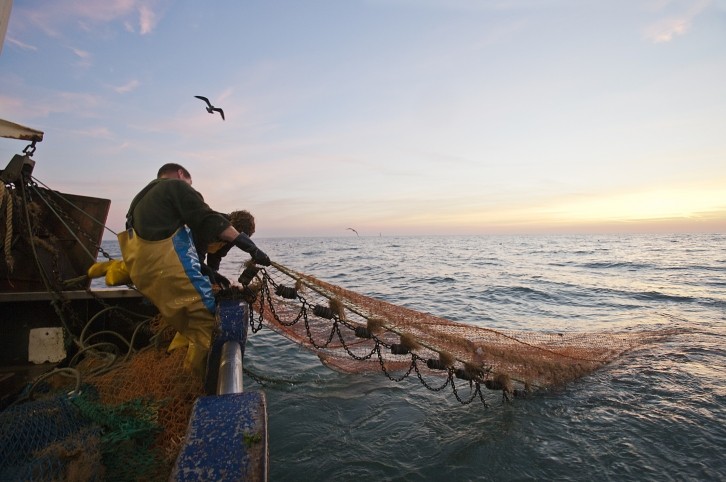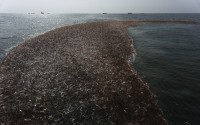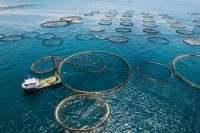Omega-3 sustainability: Pressing environmental, political and social issues driving change in the industry

As part of its ongoing work to showcase the sustainability of the omega-3 industry, GOED commissioned the report from sustainable food consultancy Tasting the Future.
The report highlights more than 20 issues and trends that could impact the EPA and DHA omega-3 category in the next 10 years and provides examples of current work by industry to improve sustainability.
Noting mounting pressures from stakeholders across the industry, the report points out there is pressure on governments to implement legislative changes to address declining fish stocks, reduce the impacts of climate change and address issues such as marine and plastic pollution.
What's more, organisations such as Greenpeace and certification bodies such as Friend of the Sea (FoS) have been putting increasing pressure on the sector to improve sustainable fisheries management.
Also, consumers are increasingly concerned about health, sustainability and animal welfare, retailers are demanding greater levels of traceability and transparency and investors are shifting their focus too.
The report notes that the financial impacts of resource degradation are beginning to materialise for omega-3 oil companies in the form of limitations in supply and
price volatility.
“A supply and demand crunch for omega-3 products, underpinned by resource constraints and climate impacts are likely to continue to lead to ongoing future price/cost shocks,” it states.
It asserts that lack of action is not an option as the market and reputation risks are huge. Plus there are the wider societal risks, including ecosystem collapse, climate breakdown and resource scarcity which “will have a devastating impact on the ability to provide enough food and water in the future and ultimately undermine the quality of life for all”.
Sustainable development goals
The Sustainable Development Goals (SDGs) are the universal call for action on sustainability. The SDG framework commits all 193 UN member states to the achievement of 17 goals and 169 targets, spanning the three dimensions of economic, social and environmental development.
The Horizon scan report asserts the omega-3 oil industry should commit to all 17 SDGs with 8 SDGS of particular relevance, perhaps most notably: promote well-being and decent work for all, ensure sustainable consumption and production patterns, combat climate change, and conserve and sustainably use the oceans, seas and marine resources.
Pressing issues
The report outlines a wide range of issues with one being the growing number of overfished stocks globally, which has tripled in half a century. It states that one-third of the world's assessed fisheries are currently pushed beyond their biological limits, according to the Food and Agriculture Organization of the United Nations. Around 46% of small pelagic fish stocks, one of the most significant sources of global fish oils, are currently overfished.
Overfishing is closely tied to bycatch—the capture of unwanted sea life while fishing for a different species. "This, too, is a serious marine threat that causes the death hundreds of thousands of sea turtles and cetaceans," the report states.
"Dwindling fish stocks worldwide, combined with a growing population, means there is an increasing likelihood of a supply gap in omega-3 fatty acids and this is driving research and innovation in search of novel sources."
Meanwhile, as a result of global warming, areas in the tropics are predicted to see declines of up to 40% in potential seafood catch by 2050. In contrast, areas in higher latitudes, such as the North Atlantic and North Pacific, are seeing increases in the range of some fish species.
Rising sea temperatures are also decreasing the amount of EPA in plankton, which could impact the nutritional quality of food we consume from the ocean. This first ever survey of planktonic lipids in the global ocean, led by scientists at the Woods Hole Oceanographic Institution (WHOI), found a temperature-linked decrease in the level of EPA production.
And consumer demand is a huge pressure too. On social media there’s a large conversation surrounding omega-3s, with more than 2.1 million Instagram uses of #Omega3, and nearly 72,000 more of #Omega3s.” TikTok videos with #Omega3 in the captions have captured 220 million-plus views as of August 30, 2022
Industry solutions
Realising the importance of these issues, businesses are working to build sustainable omega-3 supplies.
Aker Biomarine has set up an internal accounting system which is audited externally. The firm has set targets with a focus on carbon dioxide monitoring in order to determine what areas of the value chain result in the largest GHG emissions.
DSM has been building its 'life’s OMEGA' portfolio around 100% vegan omega-3 oils, which are derived from sustainably cultivated algae—leaving no impact on
marine ecosystems and appealing to eco-conscious consumers. Driven by sustainability and resource constraints, DSM aims to make the transition away from fish-based oils to oils entirely sourced from algal products.
Vegan omega-3 brand Calgee launched new plant-based plastic pouches for its supplements and is switching from virgin fossil fuel based plastic bottles. They claim the plastic pouches are carbon negative—removing more carbon dioxide from the atmosphere than emitted. The initial run of pouches generated a negative carbon footprint of 31 kg after taking production and logistics emissions into account.
Olvea’s fish oil refinery is housed within a building designed to have the lowest environmental impact with 1,300m² of photovoltaic panels installed on the roof. The rest of the energy supply of the plant is purchased from green sources of gas and electricity. The green plant is equipped with numerous heat exchangers to recover and interchange heat energy at different stages of the process. Olvea has also installed three rainwater storage tanks, with a storage capacity of 1 million litres, to recover up to 12 million litres per year.
Using gene technology, CSIRO scientists have developed Nutriterra, Nuseed’s plant-based total omega-3, by transferring the ability to produce long chain omega-3 oils from lower plants (the marine microalgae that fish consume) into canola, the world's second largest oilseed crop. This involved introducing a set of eight transgenes which extended canola's short-chain omega-3 synthesis pathway all the way to marine-type EPA and DHA fatty acids. There is considerable interest and a field of science that is synthesising omega‐3 fish oils in transgenic plants.
Plant scientists at Rothamsted Research in Harpenden, UK, have seen an application made for regulatory approval for the industrial use of their Camelina plant which has been genetically modified so its seed oils provides the same levels of EPA and DHA as fish oil. After collaborating with Massachusetts-based Yield10 Bioscience, Inc. at the end of 2020, the lab project is transforming into a truly scalable commercial opportunity thanks to Yield10's application for approval for the plant to be grown commercially by farmers in the US.
Meanwhile, providing a non-GM plant source of omega-3, Stratrum Nutrition claims its Ahiflower oil is a complete and balanced, sustainable and regenerative, source of omegas 3, 6, and 9 fatty acids. Ahiflower oil naturally contains a uniquely high content of SDA, a plant-based omega-3 fatty acid that easily converts to EPA and DHA in the body.
















